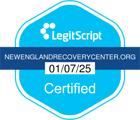Inpatient detoxification and rehabilitation programs provide an excellent foundation for anyone looking to gain the skills needed to deal with addiction. These programs provide rigorous structures and an array of daily services to help them maintain their sobriety. Once clients return to the world outside inpatient treatment, however, keeping up those routines without outside support can be very difficult.
Some people are not necessarily ready to leave behind the structures and support provided in a rehab program. At New England Recovery Center (NERC) and Spectrum Health Systems, we believe in providing clients with a full continuum of care that extends beyond the doors of our facilities. For some clients, that may mean spending time in a transitional housing situation or sober living community.
What is Sober Living?
Sober living homes and communities are places that newly sober people can go to live in a substance-free environment with their peers. The rules vary for each facility, but the underlying concept is the same. These are places where adults can live independent lives – go to work, cook their own meals and come back to a supportive and recovery-friendly environment. All of the other residents of the sober living facility will be following the same substance-free rules and will be able to offer each other support with their recovery.
Many sober homes also offer additional services for their residents, such as job training or group therapy, to give them additional skills for self-sufficiency. In this supportive environment residents can offer each other support while learning themselves how to succeed independently.
Why are Sober Living Communities Successful?
Relapse is very common in the first few weeks after completing a formal treatment program. The sudden shift back to regular life can disrupt newly formed habits. On top of that, re-entering the real world means the return of real-world problems. Where will you live? How will you pay rent? How will you continue treatment? The stress of finding work and housing is a huge factor in relapse and, of course, people won’t have the time or inclination to begin outpatient treatment when they’re struggling to find employment.
Sober living facilities take away the stress of finding a place to live. They give you the time and space to figure out next steps. They are especially helpful for those who have experienced a negative home life or a history of relapse and know they will need a safe and supportive environment to be successful in their recovery.
How Can I Join Sober Living Community?
Don’t be afraid to ask for help if you need it. If you feel unsure about what to do after completing your inpatient treatment program, talk to your counselor about sober living housing options. They can help you find a suitable facility or home near you. At NERC and Spectrum, we’re also able to offer clients financial assistance through our short-term Transitional Housing Assistance Program funded by the Reliant Foundation.
Recovery is a lifelong journey and joining a sober living community may be a necessary next step. Get in touch with us today to see if sober living is the right course of action for you.
If you or a loved one is struggling with addiction, call the New England recovery Center today at 1-877-MyRehab.











